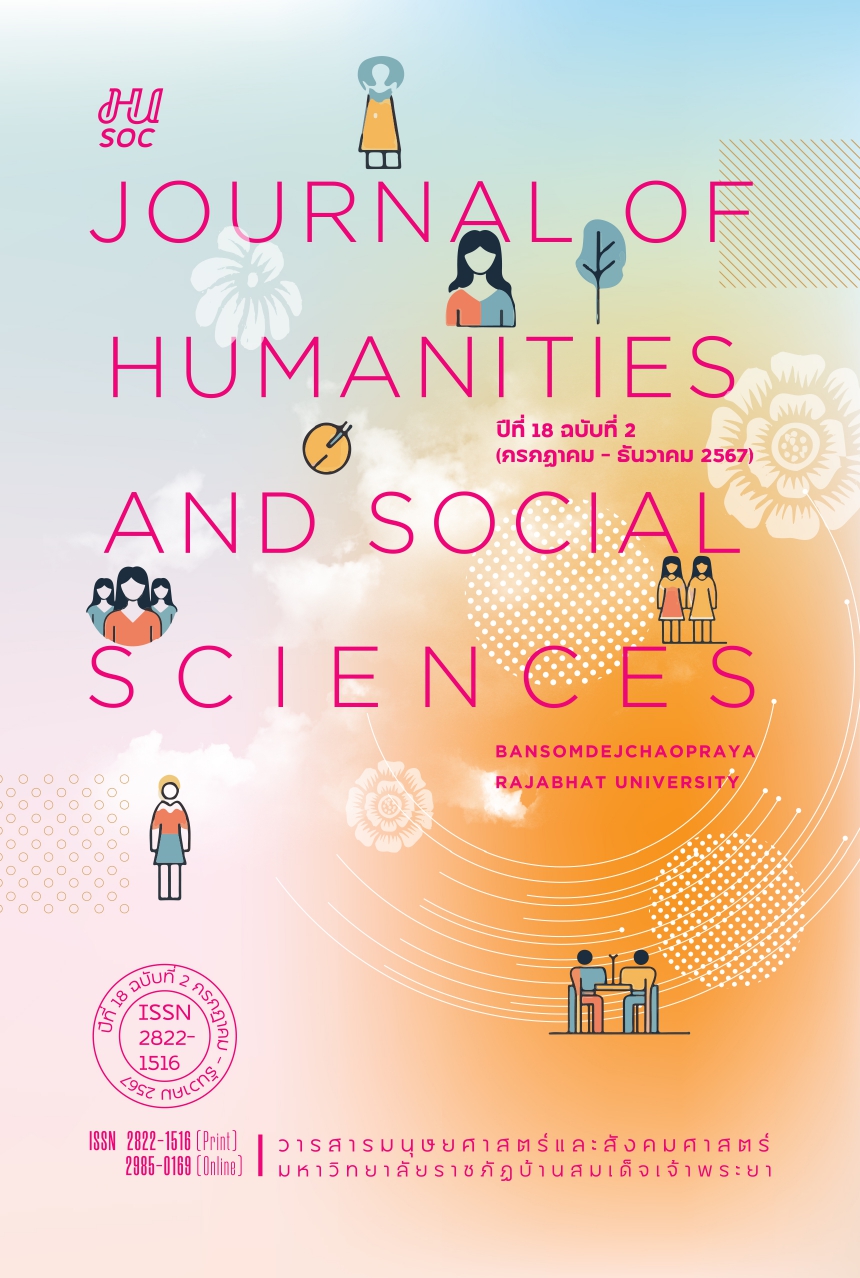การผสานปัญญาประดิษฐ์และกฎเกณฑ์ทางธุรกิจเพื่อเพิ่มมูลค่าการท่องเที่ยวเชิงวัฒนธรรมอาหาร
คำสำคัญ:
การท่องเที่ยวเชิงวัฒนธรรมอาหาร, ปัญญาประดิษฐ์, กฎเกณฑ์ทางธุรกิจ, ห่วงโซ่อุปทานดิจิทัล, ผู้ประกอบการท้องถิ่นบทคัดย่อ
การท่องเที่ยวเชิงวัฒนธรรมอาหารในเขตการท่องเที่ยวคลัสเตอร์ชายฝั่งทะเลภาคตะวันออกได้รับผลกระทบจากการเปลี่ยนผ่านทางดิจิทัลและพลวัตของห่วงโซ่อุปทานที่มีความซับซ้อน โดยผู้ประกอบการและชุมชนในท้องถิ่นพบความท้าทายเมื่อพยายามใช้ประโยชน์จากการพัฒนาทางดิจิทัลที่ทันสมัย พบข้อจำกัดความรู้ด้านกฎระเบียบและเทคโนโลยีที่เกี่ยวข้องซึ่งสิ่งเหล่านี้ขัดขวางความสามารถในการรักษาความได้เปรียบในการแข่งขันในตลาด การวิจัยครั้งนี้มีวัตถุประสงค์เพื่อศึกษาการปรับใช้ปัญญาประดิษฐ์ (Artificial Intelligence: AI) และกฎเกณฑ์ทางธุรกิจเพื่อปรับปรุงและเพิ่มประสิทธิภาพแก่ผู้ประกอบการและชุมชนในท้องถิ่นในห่วงโซ่อุปทานดิจิทัลในภาคธุรกิจการท่องเที่ยวเชิงวัฒนธรรมอาหาร การวิจัยใช้วิธีการวิจัยแบบผสมผสานโดยเก็บรวบรวมข้อมูลเชิงคุณภาพและเชิงปริมาณ และใช้การสำรวจและการสัมภาษณ์กลุ่มผู้ประกอบการในท้องถิ่นและหน่วยงานที่เกี่ยวข้องที่ตั้งอยู่เขตการท่องเที่ยวคลัสเตอร์ชายฝั่งทะเลภาคตะวันออกของประเทศไทย ได้แก่ จังหวัดชลบุรี จังหวัดจันทบุรี จังหวัดระยอง และจังหวัดตราด ผลการวิจัย พบว่า มีแนวโน้มเชิงบวกของการปรับใช้ปัญญาประดิษฐ์ต่อการเพิ่มประสิทธิภาพ การตอบสนองและการปรับตัวในห่วงโซ่อุปทานดิจิทัลในการท่องเที่ยวเชิงวัฒนธรรมอาหาร กล่าวคือ พบการวิเคราะห์ข้อมูลแบบเรียลไทม์ การประเมินความต้องการของกลุ่มลูกค้า การตอบลูกค้าด้วยปัญญาประดิษฐ์ การวิเคราะห์คุณค่าอาหาร การจัดทำภาพ จำแนกรูปภาพและรายการอาหาร เป็นต้น อย่างไรก็ตาม ผลการวิจัยยังพบช่องว่างทางกฎหมายและกฎระเบียบที่เข้มงวดซึ่งเป็นดาบสองคม เป็นข้อจำกัดและอุปสรรคในการปฏิบัติตามกรอบจริยธรรมและมาตรฐานที่ส่งผลต่อการยับยั้งนวัตกรรม ผลการวิจัยชี้ให้เห็นถึงการพัฒนาที่จำเป็นเพื่อจัดสมดุลทางนิเวศระหว่างกรอบกฎเกณฑ์การกำกับดูแลที่ส่งเสริมนวัตกรรมและการคุ้มครองผลประโยชน์ของผู้มีส่วนได้ส่วนเสีย โดยได้เสนอการจัดฝึกอบรม “การปรับใช้ปัญญาประดิษฐ์และกฎระเบียบทางธุรกิจในอุตสาหกรรมการท่องเที่ยวเชิงวัฒนธรรมอาหาร” แก่ผู้ประกอบการและชุมชนท้องถิ่น และเสนอแนะแนวทางการสร้างความร่วมมือระหว่างหน่วยงานภาครัฐและภาคเอกชนเพื่อเพิ่มโอกาสการเข้าถึงเทคโนโลยีปัญญาประดิษฐ์แก่ผู้ที่เกี่ยวข้องเพื่อช่วยเหลือผู้ประกอบการในท้องถิ่นให้สามารถใช้ประโยชน์จากปัญญาประดิษฐ์ในการเพิ่มมูลค่าและผลประโยชน์ทางเศรษฐกิจของชุมชน งานวิจัยได้จัดทำข้อเสนอแนะโดยเสนอการวิจัยทางกฎหมายในอนาคต รูปแบบ BCG และการวิจัยเชิงนโยบายเพื่อมุ่งให้เกิดการเติบโตทางเศรษฐกิจแบบครอบคลุม ยั่งยืน และแบบบูรณาการทางเทคโนโลยีในอุตสาหกรรมการท่องเที่ยวเชิงวัฒนธรรมอาหารต่อไป
เอกสารอ้างอิง
Andersson, T. D., Mossberg, L., & Therkelsen, A. (2017). Food and tourism synergies: Perspectives on Consumption, Production and Destination Development. Scandinavian Journal of Hospitality and Tourism, 17(1), 1-8.
Artharn, D., & Jaroenwisan, K. (2022). Gastronomy Tourism Development Based on BCG Economic Concept. Valaya Alongkorn Review, 12(2), 276-291.
Bangkok Bank. (2019). Food Tourism: Eat to understand the local way. Retrieved July 9, 2023. https://www.bangkokbanksme.com/en/food-tourism-lifestyle
Chen, Q. (2013). An Investigation of Food Tourism in Chongqing. International Journal of Management Cases, 15(4), 110-121.
Chopra, S., & Meindl, P. (2007). Supply chain management, Strategy, planning & operation. Gabler.
Chotsopanon, J., Mongkolnimitr, S., & Udomkitti, P. (2020). Upgrading The Value Chain of Local Experience Tourism: A Case Study of Prototype Route of Sukhothai Province. International Thai Tourism Journal, 16(1), 57-80. [In Thai]
CNN Travel. (2023). 10 best cuisines in the world. Retrieved September 9, 2023. https://edition.cnn.com/travel/article/world-best-food-cultures/index.html
EEC Policy Committee. (2018). Action Plan on EEC tourism development and promotion. Retrieved June 6, 2023. https://www.eeco.or.th/web-upload/filecenter/untitled%20folder/EEC010.pdf [In Thai]
Ellis, A., Park, E., Kim, S., & Yeoman, I. (2018). What is food tourism?. Tourism management, 68, 250-263.
Floater, G., & Mackie, L. (2016). Travel Distribution: the end of the world as we know it. LSE Enterprise Limited.
Hall, C. M., & Sharples, L. (2004). The consumption of experiences or the experience of consumption? An introduction to the tourism of taste. In Food tourism around the world. Routledge.
Hjalager, A. M., & Johansen, P. H. (2013). Food tourism in protected areas sustainability for producers, the environment and tourism?. Journal of Sustainable Tourism, 21(3), 417-433.
Jantharachit, K., Suttalung, P., Kosasaeng, T., & Thamsupree, S. (2022). Has Thai tourism recovered yet?. Retrieved September 27, 2023. http://www.fpojournal.com/thai-tourism-situation/ [In Thai]
Jitvirat, K. (2018). Adaptation Model of Business Organizations from the Digital Disruption Impact in the 21st Century. Journal of the Association of Researchers, 23(2), 74-88. [In Thai]
Kaukal, M. R., Hopken, W. F. & Werthner, H. (2000). An approach to enable interoperability in electronic tourism markets. (8th ed.) European Conference on Information System (ECIS 2000).
Kesimoğlu, A. (2015). A reconceptualization of gastronomy as relational and reflexive. Hospitality & Society, 5(1), 71-92.
Mahapornprajak, T. (2021). COVID Accelerates Business Transformation into Digital. Retrieved September 27, 2023. https://www.bot.or.th/th/research-and-publications/articles-and-publications/articles/Article_24Apr2021.html [In Thai]
Naritomi, S., & Yanai, K. (2020). CalorieCaptorGlass: Food calorie estimation based on actual size using hololens and deep learning. In 2020 IEEE Conference on Virtual Reality and 3D User Interfaces Abstracts and Workshops (VRW) (pp. 818-819). IEEE.
Netherlands Development Organization. (2010). Value Chain Development for Tourism Destinations. Retrieved September 9, 2023. http://www.hitt-initiative.org/wp/wp-content/uploads/2011/11/GHTDP-VCD-Guidelines.pdf.
Pavlidis, G., Markantonatou, S. L., Toraki, K. R., Vacalopoulou, A. N., Strouthopoulos, C.L., Varsamis, D.T., Tsimpiris, A.V., Mouroutsos, S.R., Kiourt, C.R., Sevetlidis, V.L. & Minos,
P.G. (2020). AI in gastronomic tourism. Proceedings of the2nd International Conference on Advances In Signal Processing and Artificial Intelligence, pp.168–174. https://doi.org/10.5281/zenodo.3862543
Quan, S., & Wang, N. (2004). Towards a structural model of the tourist experience: An illustration from food experiences in tourism. Tourism management, 25(3), 297-305.
Scarpato, R. (2000). New Global Cuisine: The Perspective of Postmodern Gastronomy. [Unpublished Masters Thesis, RMIT University].
Sitthikan, A. (2022). Ethnic Foods: Driving Force of Thai Tourism After Opening The Country?. Retrieved October 9, 2022. https://www.bangkokbiznews.com/business/980167 [In Thai]
Skift Research. (2019). The Future of Food Tourism in Thailand. Retrieved September 9, 2023. https://skift.com/2019/11/15/the-future-of-food-tourism-in-thailand/
Smith, S. L., & Xiao, H. (2008). Culinary tourism supply chains: A preliminary examination. Journal of travel research, 46(3), 289-299.
Tagong, W., & Apichayakul, O. S. (2023). Identity Communication of Chantaburi Local Food in Tourism Context. Ratchaphruek Journal, 21(2), 160-174.
The Digital Economy Promotion Agency. (2022). “DEPA” joins hands to revive Thailand’s tourism after COVID-19. Retrieved June 6, 2023. https://www.bangkokpost.com/thailand/pr/2426494
The National Science and Technology Development Agency. (2020). Strategies and Directions for Driving Artificial Intelligence for Thailand’s Development. Retrieved June 6, 2023. https://waa.inter.nstda.or.th/stks/pub/nac/2021/slide/ss31-lec03.pdf [In Thai]
Tophothai, N. (2015). The changing of world business megatrends and Thailand in the future. Journal of Management Science Nakhon Pathom Rajabhat University, 2(2), 124-134. [In Thai]
UNECA. (2014). Up-grading and Enhancing Sustainable Linkages of Rwanda’s Tourism Value Chains. UNECA.
Zhang Y., & Murphy P. (2009). Supply-chain considerations in marketing underdeveloped regional destinations: A case study of Chinese to Goldfields region of Victoria. Journal Tourism Management, 30(2), 278-287.
ดาวน์โหลด
เผยแพร่แล้ว
รูปแบบการอ้างอิง
ฉบับ
ประเภทบทความ
สัญญาอนุญาต
ลิขสิทธิ์ (c) 2024 คณะมนุษยศาสตร์และสังคมศาสตร์ มหาวิทยาลัยราชภัฏบ้านสมเด็จเจ้าพระยา

อนุญาตภายใต้เงื่อนไข Creative Commons Attribution-NonCommercial-NoDerivatives 4.0 International License.




